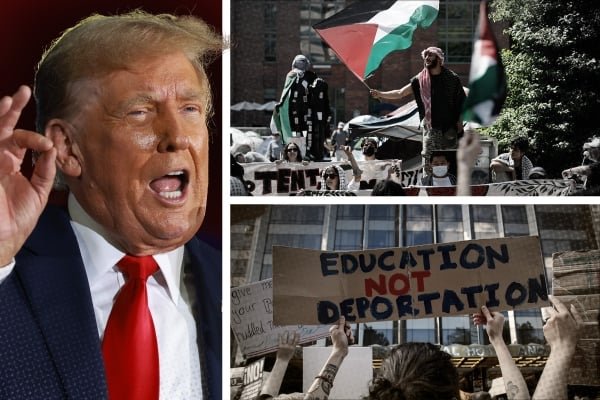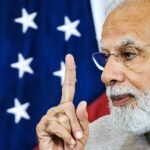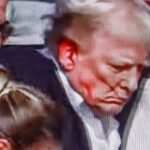Postelection uncertainty looms large for presidents
A second Trump administrations holds various unknowns for higher education.
Photo illustration by Justin Morrison/Inside Higher Ed | Joe Raedle and Chip Somodevilla/Getty Images | Kena Betancur/VIEWpress/Corbis/Getty Images
NEW YORK—With Donald Trump set to re-enter the White House in two months, many higher education professionals have more questions than answers about what his education priorities will be, a sense reflected in the palpable uncertainty among the nearly dozen college presidents who convened in Manhattan Monday evening.
The annual press dinner, hosted by Arizona State University president Michael Crow, featured questions on a wide range of topics, including the incoming Trump administration, artificial intelligence and student mental health. But politics seemed to dominate the discussion, as reporters pressed the presidents on their views of Trump’s re-election, especially in light of his frequent attacks on higher education.
The Future of ED
The question of whether Trump will abolish the Department of Education—and what that might mean for colleges and universities—was served up with the dinner’s first course. And before most presidents had finished their salads, they were weighing what changes the potential abolition of the department might bring for the regulatory environment.
“To me the question on the Department of Education is, what happens to all of its contents? Because even if you didn’t have a Department of Education, [other offices] still existed somewhere before. So what would happen to the Office for Civil Rights, for example?” asked Justin Schwartz, chancellor of the University of Colorado Boulder. “The devil is in the details.”
When to Speak Up—or Not
Another questioner asked early on how presidents assess when to speak up on issues—particularly at a time of political tensions, when many of their constituents expect them to take public stands.
Rich Lyons, chancellor of the University of California, Berkeley, stressed that leaders should focus public statements on issues that directly impact their core mission.
“There’s a lot of things we’re talking about today that are mission relevant, and we need to speak out on these things. And if they are not mission relevant … I think the tendency is toward institutional restraint,” Lyons said.
Other presidents said they worried that taking a stance on politically charged topics could have a chilling effect on discussion on campus.
“What’s so important is that we really want our students and our faculty, but our students in particular, to have the opportunity to explore ideas and to be able to talk about those ideas,” said Lewis & Clark College president Robin Holmes-Sullivan. “And if we come out in a particular way, it really does have a chilling effect. For our institution, we definitely have pulled back from making those kinds of proclamations unless it’s something that really is relevant to our institution.”
Kim Wilcox, chancellor of the University of California, Riverside, noted that the deep divide over the Israel-Hamas war and the subsequent campus protests has made it harder to release statements than in the past.
“That tension has called into question the wisdom and role of statements more broadly,” he said.
Tania Tetlow, president of Fordham University, noted that statements on issues can divide a community, yet they make little real-world impact. While she believes that presidents should respond to direct attacks on higher education, she suggested there’s little value in making proclamations on complex global issues.
“No one in Israel is waiting for my foreign policy declarations on a ceasefire,” Tetlow said.
Trump’s Policy Agenda
Presidents also fielded questions about which Trump policies most concern them. The president-elect has threatened not only to abolish the Department of Education but also to “fire” accreditors and go after diversity, equity and inclusion programs, though given his penchant for explosive campaign-trail rhetoric, it’s unclear whether he’ll follow through. Still, presidents in the room expressed concerns about all of the above, in addition to worries about how much the federal government may wade into curriculum.
“My nightmare is linking federal financial aid funding to what we can and cannot teach about diversity, equity and inclusion,” Tetlow said, adding that she was alarmed by some state laws that include vague language around banning “that which inspires collective guilt.”
“As a Catholic University, [guilt] is core to our beliefs,” she quipped.
Others worried about the government weaponizing accreditation to achieve their curricular aims.
“My biggest concern is that they use the accreditation process to manipulate curriculum,” Schwartz of Boulder said.
Taylor Randall, president of the University of Utah, struck an optimistic tone, arguing that even in deeply Republican states there is room for agreement on higher education priorities like economic development. Randall said institutions should maintain focus on areas within their expertise, whether that’s artificial intelligence, energy or matters that “play a role in national security.”
Presidents also addressed Trump’s promise of mass deportation for undocumented immigrants and the likelihood that he would target the Deferred Action for Childhood Arrivals program, which has allowed individuals brought to the country by their parents to remain and work in the U.S. Presently there are an estimated 400,000 DACA students enrolled in postsecondary education.
“First you have to follow the law, whatever the law is, as it’s being implemented,” Crow said. “And it turns out that, luckily, the law presently protects the interests of innocent children who were brought to the United States by their parents without their decision-making. We’re hopeful that as the law moves forward, it will recognize these distinctions as we do.”
Schwartz seconded the need to follow the law but also emphasized the importance of due process and the legal resources available for DACA students at the University of Colorado. It’s important, he argued, to make sure those legal resources continue to receive adequate funding.
You may be interested

What we’re LEARNing from effort to recognize undergraduate learning
new admin - Nov 21, 2024[ad_1] Picture three different individuals on their unique paths to college: One is enrolling for the first-time after years of…

Kyiv on edge amid fears over possible Russian strike
new admin - Nov 21, 2024Kyiv on edge amid fears over possible Russian strike - CBS News Watch CBS News Air raid sirens sounded across…

Peak Design’s Outdoor Backpack is a more versatile everyday bag
new admin - Nov 21, 2024Perfect is a high bar to live up to, but it’s the word I used to describe my experience with…


































